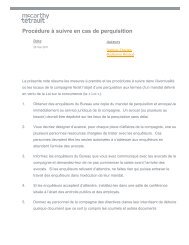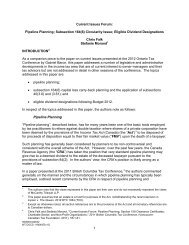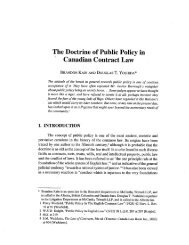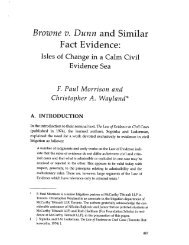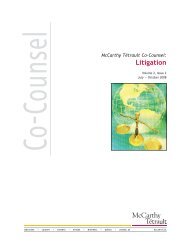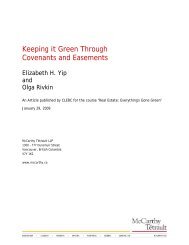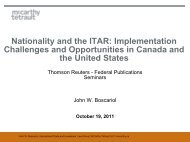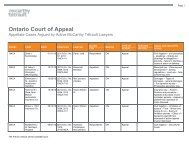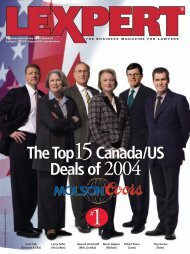1. COMPETITION - McCarthy Tétrault
1. COMPETITION - McCarthy Tétrault
1. COMPETITION - McCarthy Tétrault
You also want an ePaper? Increase the reach of your titles
YUMPU automatically turns print PDFs into web optimized ePapers that Google loves.
decided at the interim stage itself, since after time passes intellectual<br />
property often loses its value. Therefore, a practice has developed in<br />
intellectual property infringement matters where detailed evidence on<br />
affidavits is led at the interim stage and interim injunction matters are<br />
heard at length, sometimes for weeks, where the merits of the matter are<br />
argued in detail with the support of case law.<br />
It may or may not come to light whether the Karishma saga was<br />
orchestrated by a rival channel, as Sahara claimed, or whether it was just<br />
the unhappy result of a misdirected but genuine attempt to bring to book<br />
pirate Bollywood script writers, but the travails of "Karishma: The Miracle of<br />
Destiny" have clearly provided a considerable amount of publicity to the<br />
work itself.<br />
For more information please contact: vaibhav@nishithdesai.com<br />
9. MARKET ACCESS<br />
BRAZIL<br />
ANATEL ANNOUNCES CREATION<br />
OF A NEW PUBLIC SERVICE<br />
On 21st August 2003, ANATEL announced the creation of a new public<br />
service of electronic data communication, which will last until the end of<br />
2004. ANATEL's objective is to introduce public access to the Internet. Any<br />
company that is interested in rendering such service may participate on the<br />
bid.<br />
For more information please contact: rapdecunto@pinheironeto.com.br<br />
CANADA<br />
FOREIGN OWNERSHIP IN THE COMMUNICATIONS<br />
SECTOR<br />
Recently, two House of Commons Standing Committees predicted<br />
radically different futures for foreign ownership restrictions of<br />
telecommunication and broadcasting sector companies.<br />
In an April 2003 report, entitled "Opening Canadian Communications to the<br />
World", the Standing Committee on Industry, Science and Technology<br />
noted that foreign ownership restrictions had impeded raising capital in the<br />
past decade, and that these restrictions fell hardest on newer telecom<br />
companies. The Industry Committee recommended that the Canadian<br />
government remove the minimum ownership requirements, including the<br />
requirement of Canadian control applicable to telecommunications<br />
common carriers. The Industry Committee further recommended that a<br />
special parliamentary committee undertake a comprehensive review of the<br />
governance structure of both telecommunications and broadcasting<br />
sectors in Canada. The review should, at minimum, examine both the<br />
regulatory framework governing the telecommunications and broadcasting<br />
sectors, and the approaches that the federal government could adopt to<br />
continue to facilitate broadband deployment in rural and remote<br />
communities. Lastly, the committee should also examine the federal<br />
department organization of these industries, and review the jurisdiction,<br />
role, and mandate of the Canadian Radio-television and<br />
Telecommunications Commission (the "CRTC").<br />
By contrast, in a June 2003 study of the Canadian broadcasting industry<br />
entitled "Our Cultural Sovereignty: the Second Century of Canadian<br />
Broadcasting," the Standing Committee on Canadian Heritage<br />
recommended that existing foreign ownership limits for broadcasting and<br />
telecommunications be maintained. The Heritage Committee held the view<br />
that broadcasting is an essential preserve of Canadian culture and<br />
imagination, and that, should Canadians give up control of their cultural<br />
sovereignty, they may never get it back. The Heritage Committee proposed<br />
fundamental reforms to the structure and composition of the CRTC. It<br />
called on the government to consider that a single Communications Act be<br />
administered by a single department of communications. The new<br />
Communications Act would replace the Telecommunications Act, the<br />
Broadcasting Act, and the Canadian Radio-television and<br />
Telecommunications Act. The Committee further recommended revamping<br />
the current support programs for Canadian broadcasting; creating a new<br />
institution - a broadcasting monitor - that would report to Parliament on the<br />
health of the broadcasting system; and launching a local initiative fund to<br />
promote community and local broadcasting. The Heritage Committee also<br />
showed strong concerns with respect to cross-media ownership.<br />
For more information visit: www.parl.gc.ca/infoCom/CommitteeReport.asp<br />
or please contact: cmorgan@mtl.mccarthy.ca<br />
10. MEDIA<br />
INDIA<br />
MIB REVISES UPLINKING GUIDELINES<br />
On 26th March 2003, the Indian Government, in its Guidelines for Uplinking<br />
of News and Current Affairs TV Channels from India (the "Guidelines"),<br />
imposed a 26% cap on the foreign direct investment (the "FDI") in<br />
television news companies desirous of uplinking from India. This was on<br />
par with the FDI cap prevalent in the print medium relating to newspapers<br />
and periodicals dealing in news and current affairs.<br />
The Government has now revised the Guidelines issued on 26th March<br />
2003 by amending the eligibility criteria for uplinking. As per the revised<br />
Guidelines, the applicant company desirous of uplinking news and current<br />
affairs channel(s) from India is considered eligible, if it fulfils the following<br />
criteria:<br />
OWNERSHIP<br />
FDI should not exceed 26% of the Paid-up Equity of the applicant<br />
company. While calculating the 26% FDI, the foreign holding component, if<br />
any, in the equity of the Indian shareholder companies of the applicant<br />
company will be duly reckoned on pro rata basis so as to arrive at the total<br />
foreign holding in the applicant company.<br />
Equity held by the largest Indian shareholder should be at least 51% of the<br />
total equity (excluding the equity held by Public Sector Banks and Public<br />
Financial Institutions) in the New Entity.<br />
The term largest Indian shareholder includes any or a combination of the<br />
following:<br />
• in the case of an individual shareholder: (i) the individual shareholder;<br />
(ii) a relative of the shareholder within the meaning of Section 6 of the<br />
Companies Act, 1956; (iii) a company/ group of companies in which<br />
the individual shareholder/HUF to which he belongs has management<br />
and controlling interest.<br />
• in the case of an Indian company: (i) the Indian company (i.e. a<br />
company having a resident Indian or a relative/HUF, either singly or in<br />
combination holding at least 51% of the shares); (ii) a group of Indian<br />
companies under the same management and ownership control.<br />
Provided that in case of a combination of all or any of the entities<br />
ISSUE 22 SEPTEMBER – OCTOBER 2003 9



